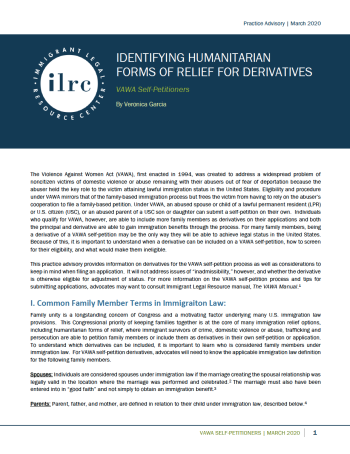
The VAWA Self-Petition allows abused immigrants to petition for legal status independently of their abuser. The process mirrors that of the family-based process but frees the victim from having to rely on the abuser’s cooperation to file a family-based petition. Under VAWA, an abused spouse or child of a lawful permanent resident (LPR) or U.S. citizen (USC), or an abused parent of a USC son or daughter can submit a self-petition on their own. Individuals who qualify for VAWA are able to include derivatives on their applications and both the principal and derivative are able to gain immigration benefits through the process. This practice advisory provides information on derivatives for the VAWA self-petition process as well as considerations to keep in mind when filing an application.

This advisory provides an overview of the most common types of motions filed with the Board of Immigration Appeals. It discusses the types of motions the Board will accept while proceedings are pending before it, such as motions to remand. It also discusses motions filed with the Board after it has issued a final order of removal, which includes motions to reconsider and motions to reopen. It contains guidelines on determining what type of motion is appropriate in specific circumstances and how to prepare and file motions in a way that meets legal requirements and complies with the Board’s procedural rules.
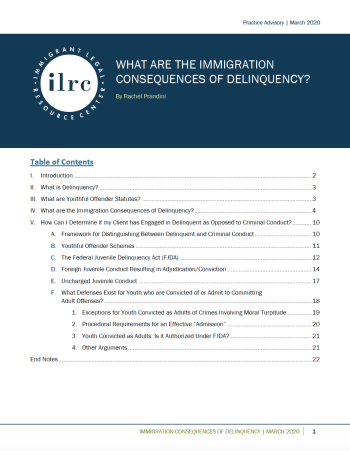
This advisory provides an overview of the immigration consequences of delinquency and helps advocates understand the distinctions between delinquency and crime to be able to assess whether a youth has committed an act of delinquency or a crime. It arms advocates with arguments to protect their noncitizen clients who have engaged in unlawful conduct as minors.
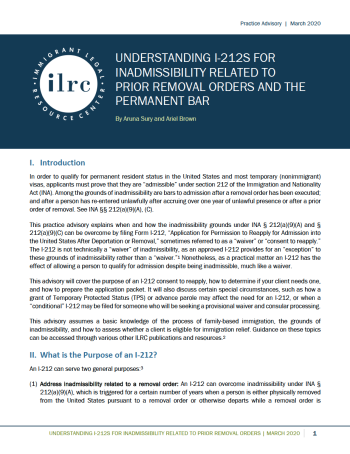
This advisory seeks to clarify when, where, and how to file an I-212. It also discusses certain special circumstances such as conditional I-212s, nunc pro tunc I-212s, and how a grant to TPS or advance parole may affect the need for an I-212. The advisory addresses strategic concerns such as deciding when to file a motion to reopen versus a conditional I-212, and assessing the risks of triggering other inadmissibility or enforcement issues when advising clients.
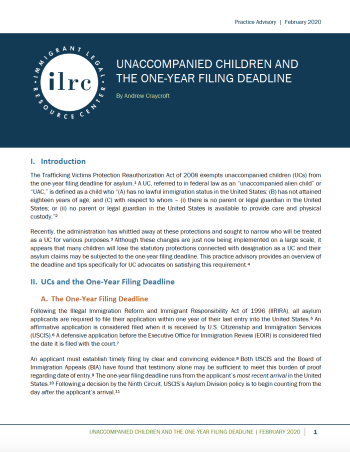
Although the TVPRA exempts unaccompanied children (UCs) from the one-year filing deadline for asylum, the current administration has been attempting to erode these protections. As a result, many UCs are at risk of losing their statutory protections and being subjected to the one-year filing deadline. This practice advisory provides UC advocates with an overview of the deadline, the exceptions for changed and extraordinary circumstances, and specific tips on satisfying this requirement in UC cases.

Since 2015, the process of immigrating to the United States as the spouse of a USC or an LPR should not be any different for an LGBTQ couple than any other couple. However, advocates working with LGBTQ couples may need to consider a variety of factors when documenting and providing representation for an LGBTQ marriage-based petition. For example, is the couple currently living a jurisdiction where they can lawfully marry? And, if not, what other options does a couple have? And how might a marriage-based petition packet look if the couple has not shared their marriage or LGBTQ identity with one or both of their families? This advisory will address the first step of the marriage-based immigration process for same-sex married couples: submitting evidence of a bona fide marriage. It will also discuss red flags to address when preparing such applications and strategies for preventing fraud accusations by USCIS.
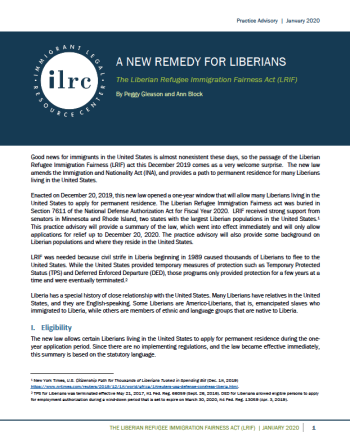
Effective December 20, 2019, the Liberian Refugee Immigration Fairness (LRIF) act opened a one-year window that will allow many Liberians living in the United States to apply for permanent residence. The act was buried in Section 7611 of the National Defense Authorization Act for Fiscal Year 2020. This practice advisory will provide a summary of the law, which went into effect immediately and will only allow applications for relief up to December 20, 2020.
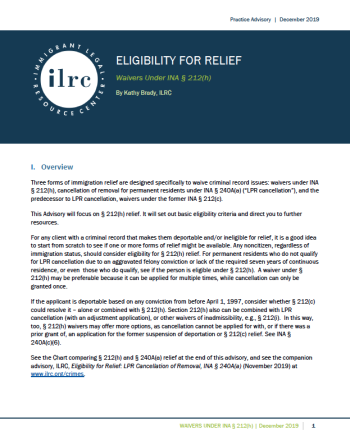
Section 212(h) of the INA provides a waiver for crimes inadmissibility grounds, which can be surprisingly useful for undocumented people, VAWA applicants, or permanent residents. It can be applied for multiple times; it has the potential to waive an aggravated felony conviction (unless it is related to drugs); it can be used both affirmatively and as a defense to removal; and it does not always require proof of "extreme hardship." Unfortunately, it can't be used to waive drug convictions or conduct, other than a single incident involving possessing a small amount of marijuana.
The nonimmigrant status, often referred to as the “T visa” is a form of immigration status for certain noncitizen survivors of trafficking. This visa was created by Congress to help combat human trafficking and provide immigration relief to persons who were affected. As part of the protections given, Congress allowed for applicants to petition for certain family members to gain status. These family members are known as “derivatives.” For many family members, being a derivative on an application may be the only way they will be able to get legal status in the United States. This practice advisory provides information on derivatives for T nonimmigrant status as well as considerations to keep in mind when filing an application.
The U nonimmigrant status, often referred to as the “U Visa,” is a form of immigration relief available to noncitizens who have been victims of serious crimes in the United States. As part of the protection given to victims of crimes, U petitioners are able to include certain family members in the application process. These family members are known as “derivatives”. For many family members, being a derivative on an application may be the only way they will be able to get legal status in the United States. This practice advisory outlines the requirements for U nonimmigrant derivatives as well as considerations to keep in mind when filing an application.